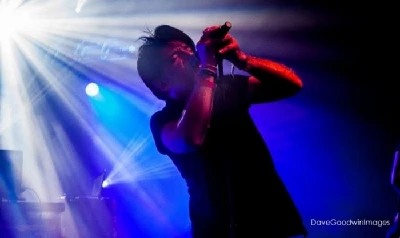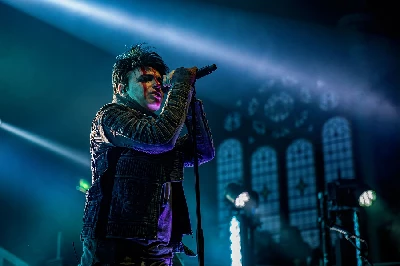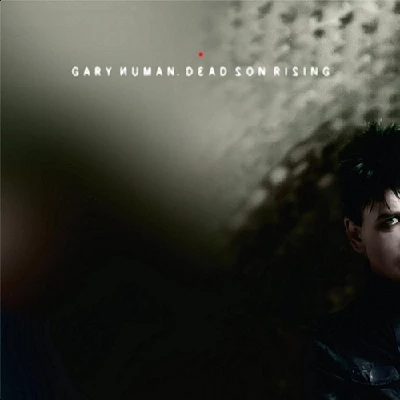Gary Numan - Interview
by Paul Waller
published: 3 / 10 / 2013

intro
Paul Waller talks to Gary Numan about his much acclaimed new album 'Splinter', his recent move to Los Angeles and his early 80's career
Gary Numan is a man who has had it all. At his creative peak in the late 1970s and early 80s he was a million-selling, number one artist that paved the way for electronic music to be accepted by the mainstream record buying public. Since then he has been the first to admit that he lost his way, and by the release of 1992’s ‘Machine+Soul’ he had hit rock bottom both personally and creatively. Redemption, though, is at hand. A lot has already said about his latest album since he reported himself last year that the new record will be entitled ‘Splinter (Songs from a Broken Mind)’ and that it would be a “very heavy, very aggressive and very dark” effort. Many fans and critics have seen the collaborative work that has been spawned in the last couple of years with Gary’s involvement, and it would seem for the first time in decades there is a buzz doing the rounds about his new direction. We at Pennyblackmusic have heard the new album and have to say that it is a corker. We had to get in touch with Gary to find not only about the crafting of his latest work, but how he deals with the demons from his past today. PB: With the ‘Battles and Officer’s tracks in the bag over the past couple of years plus the new album ‘Splinter’ about to drop as well, it feels as if you are reaching another creative peak. Being the catalyst of this do you feel that as well? GN: I feel as if I’m writing as well, if not better, than I ever have before. It seems to me that so many artists or bands that have been around for a long time begin to bland out, to get safe and more middle of the road. Not all of them of course but most. I seem to be going in the opposite direction. My music is getting heavier and darker all the time, more aggressive, less commercial. The difficulty of going deeper in that direction is that it’s very hard to get that type of music heard; the outlets for it are few and far between. Radio won’t touch it, or rarely; TV shows don’t want it, so it’s not easy. But, I’ve made a clear choice to make the kind of music I make, so I’m absolutely not grumbling. Each album is a clear statement that I’m a million miles away from writing safe, middle of the road shit to milk the rest of my career. I’m still trying to push forward, do new things. A number of reviews have talked about ‘Splinter’ being the best album I’ve ever made so I guess I must be at, or nearing, another creative peak. I think that’s something to be very proud of after doing this for such a long time. PB: Did you get the feeling when you were recording ‘Splinter’ that it was more than just the sum of its parts? Do you feel that ‘Splinter’ could well be your most cohesive work? GN: To be honest when I was writing it I was plagued as always with massive self doubt and worries. I have never been blessed with a great deal of confidence, no matter how many successes I may have had over the years. I have always felt lucky rather than talented. The end result of all that lack of confidence is a rather emotional and moody time in the studio. I worry constantly; hate what I’m doing frequently. I can write something in the morning that I love. and by lunch time think it’s a huge piece of crap and erase it. I have to work really hard to keep my confidence at a level that stops me erasing everything at the end of each day. To me starting a new album is a huge mountain to climb, a huge project, and I find each one a little more daunting than the last. ‘Splinter’ was, therefore, the hardest of all so far. But, having said all that, I am now slowly becoming comfortable with it and, even more slowly, quite proud of it. PB: The lyrics appear at first glance to be pretty dark and bleak, especially for a record that was completed in sunny Los Angeles. On the opening track, ‘I am Dust’, what do you mean by the line, “We all prayed for the end/For their gods to take us”? GN: There are two songs on the album, ‘I am Dust’ and ‘We’re the Unforgiven’, which are ideas taken from a novel I have been working on for a number of years. From time to time I borrow ideas from the book and turn them into lyrics. In ‘I am Dust’ a group of people are being hunted, and have been relentlessly for quite some time. They are tired and beaten and at the end of their endurance. PB: What can we expect from the ‘Splinter’ live shows? How much of the new album can we expect to be aired? GN: I’m not sure exactly but around eight or nine of the twelve songs on the album, maybe ten. I’m going to add a few more of the much older catalogue songs, and also take out a number of songs from the last few albums that I’ve done to death over the last fifteen years. This will make room for more tracks from ‘Splinter’, so the set will be, hopefully, a breath of fresh air to people that have been to see me a lot over the last few years. I’m also making a big investment in the light show itself. It will be, easily, the best thing I’ve done since the glory days of mega shows in the late 70s and early 80s. Not mega as they were but a mighty step in the right direction. I’m very excited about that actually. PB: The cover art is fantastic. How did the concept come about? GN: I saw some photographs that the La Roach Brothers had done and that got my mind thinking along the lines of Victoriana and steam punk. We arranged for the La Roach Brothers to take the photos, I kitted myself in the appropriate clothing and it all came together amazingly well. I’d like to say there is a clear connection between the cover art and the music, but, in truth, it’s far more abstract. It works really well but I must admit I don’t exactly know why. It just felt the right way to go from the very beginning. PB: Between ‘Jagged’ and ‘Splinter ‘there was a seven year gap [although obviously ‘Dead Son Rising’ filled part of it]; have you had thoughts already about what comes next? GN: Definitely. There were good, if unfortunate, reasons why it took me so long to get started on ‘Splinter’, but that’s all over now so the next one will be ready in far less time. I have a film score to write with Ade Fenton in December and January, and then a lot of touring throughout next year, but I intend to have the next album ready by the end of 2014. I really do feel as if I’m on an incredible roll at the moment and I want to get as many songs written as I can while it holds good. I’ve had difficult periods before, and so I know from bitter experience that when you are on a good one you need to make the most of it. PB: I understand you have just got your first tattoo. How did it go and why did you wait so long to get one? GN: Cowardice is why it took so long. They hurt and I simply didn’t fancy the pain. I met Amy Nicoletto at a video shoot for my ‘Love Hurt Bleed’ single in Los Angeles recently and she offered to tattoo me. When I explained my reluctance, she told me she had numbing cream that would take away most of the pain, so I decided to go for it. Actually, my wife Gemma decided for me and then bullied me to see it through. On my left arm I have written ‘Gemma, until God takes me away,’ I had the same words engraved on her wedding ring many years ago. On my right arm I have the children’s names and the words ‘If God calls your name, I will die for you.’ They are in the Persian Farsi language which is particularly beautiful when written, I think. PB: Before ‘Splinter’ my favourite trio of albums you have made are ‘Telekon’, ‘Dance’ and ‘I, Assassin’ from 1980-82. I have a couple of questions about this period. Firstly with ‘Telekon’, you were at the height of your fame at this point and you have had years to think about this, so may I ask why do you think the press made you into such a villain when you first had huge success? GN: There was a huge resistance in most areas of the media to electronic music when it first came along, so I took the brunt of the hostility that came with that. Also, I was the first big pop star to come along as the punk anti-hero thing was fading. I think that upset a lot of people who were still immersed in that anti-star thinking. To make it worse, I really played up to that which wasn’t very tactful or clever of me so I made it a lot worse than it needed to be I think. I’m as much to blame for the poor relationship I had with the press back then as they were, so I have no hard feelings. I’m just glad it’s so much better now. PB: Do you have a favourite track from 1980’s ‘Telekon’ now, and why? GN: ’I’m an Agent’ was always a favourite. I like the vocal melodies and the guitar sound is all phasing and messy, which I thought was cool. I remember I woke up from a dream with the melody in my head, and had a mad rush trying to find something to hum it into before it faded. PB: 1981’s ‘Dance’ is such an unusual album. It must have taken a serious set of balls to release such an incredibly artistic endeavour after such massive success. Did you feel it might alienate your audience at the time? GN: I didn’t actually but I should have done. I remember Martin Mills at Beggars Banquet, the record label, sitting me down and trying to very tactfully point out that it might not be the best album at that stage of my career. He was quite right of course, it was far too adventurous at that stage of the career and it definitely alienated a lot of fans, but I was very proud of it. I didn’t want to just keep churning out the same old stuff; I wanted to wander off in different directions, to stretch myself as a songwriter and producer. Strangely, though, it’s also one of the favourites of those fans that stayed with me. It’s one of my favourites as well. PB: And then in 1982 ‘I, Assassin’ came out; most critics centre on Pino Paladino’s bass style, but when you look deeper the palate of sounds is pretty close to what Prince was using on ‘1999’. Your album came out a month before his; were you aware of Prince that early on? GN: No. I came to admire him, but many years later. It was when I heard Pino play that I decided to make the bass the main melody instrument. I hadn’t really heard it used that way before but he was such an amazing player it seemed to make sense. And it certainly made for an interesting sounding album. Another step in the wrong direction for the record company I think but, again, I was really happy with it. PB: And, finally, as early as 1982 you said that when you were a kid you dreamed of just two things: being a pilot and being a rock star and that now you had achieved both of these you had run out of things to dream about. Does that still stand? GN: In a way; I became an aerobatic display pilot flying World War 2 aeroplanes so I got pretty good at that. When the children came along, I decided to get out of it as most of the people I knew that did it had been killed along the way. It seemed too dangerous a thing to do with a young family just beginning. I haven’t found anything else that has matched the feelings of exhilaration and satisfaction though. I still miss it. I guess being on stage is the closest which is probably why that is now the thing I look forward to the most. I guess with the children you have new dreams, but they’re more about their future than my own. PB: Thank you.
Band Links:-
https://garynuman.com/https://www.facebook.com/GaryNumanOfficial/
https://garynuman.lnk.to/TwitterWE
interviews |
|
Interview (2011) |
| Influential electronic music artist Gary Numan speaks to Andy Cassidy about his new album ‘Dead Son Rising’, its difficult inception and his career which is now five decades long |
live reviews |
|
Forum, London, 23/10/2015 |

|
| Dave Goodwin at the Forum in London watches Gary Numan at the end of a three night residency play all of his 1980 album 'Telekon' and perform an astounding set which Numan has said is probably the best gig of his career |
| Gary Numan/Gang of Four - Hammersmith Apollo, London, 28/11/2014 |
| Rock City, Nottingham, 10/11/2013 |
| Rock City, Nottingham, 8/12/2012 |
| ABC, Glasgow, 23/5/2012 |
photography |
|
Photoscapes (2022) |

|
| Andrew Twambley takes photographs of Gary Numan at a show at the Albert Hall in Manchester. |
| Photoscapes (2014) |
reviews |
|
Dead Son Rising (2011) |

|
| Triumphant latest album from Gary Numan who thirty three years on from his first release shows no sign of slowing down and which showcases some of his best work |
most viewed articles
current edition
Screamin' Cheetah Wheelies - Sala Apolo, Barcelona, 29/11/2023 and La Paqui, Madrid, 30/11/2023Anthony Phillips - Interview
Difford and Tilbrook - Difford and Tilbrook
Rain Parade - Interview
Oldfield Youth Club - Interview
Autumn 1904 - Interview
Shaw's Trailer Park - Interview
Cafe No. 9, Sheffield and Grass Roots Venues - Comment
Pete Berwick - ‘Too Wild to Tame’: The story of the Boyzz:
Chris Hludzik - Vinyl Stories
previous editions
Microdisney - The Clock Comes Down the StairsWorld Party - Interview
Michael Lindsay Hogg - Interview
Heavenly - P.U.N.K. Girl EP
Ain't That Always The Way - Alan Horne After The Sound of Young Scotland 2
World Party - Interview with Karl Wallinger
Joy Division - The Image That Made Me Weep
Dwina Gibb - Interview
Steve Harley - Interview
Prisoners - Interview
most viewed reviews
current edition
Marika Hackman - Big SighSerious Sam Barrett - A Drop of the Morning Dew
Rod Stewart and Jools Holland - Swing Fever
Ian M Bailey - We Live in Strange Times
Loves - True Love: The Most of The Loves
Paul McCartney and Wings - Band on the Run
Autumn 1904 - Tales of Innocence
Roberta Flack - Lost Takes
Banter - Heroes
Posey Hill - No Clear Place to Fall
Pennyblackmusic Regular Contributors
Adrian Janes
Amanda J. Window
Andrew Twambley
Anthony Dhanendran
Benjamin Howarth
Cila Warncke
Daniel Cressey
Darren Aston
Dastardly
Dave Goodwin
Denzil Watson
Dominic B. Simpson
Eoghan Lyng
Fiona Hutchings
Harry Sherriff
Helen Tipping
Jamie Rowland
John Clarkson
Julie Cruickshank
Kimberly Bright
Lisa Torem
Maarten Schiethart